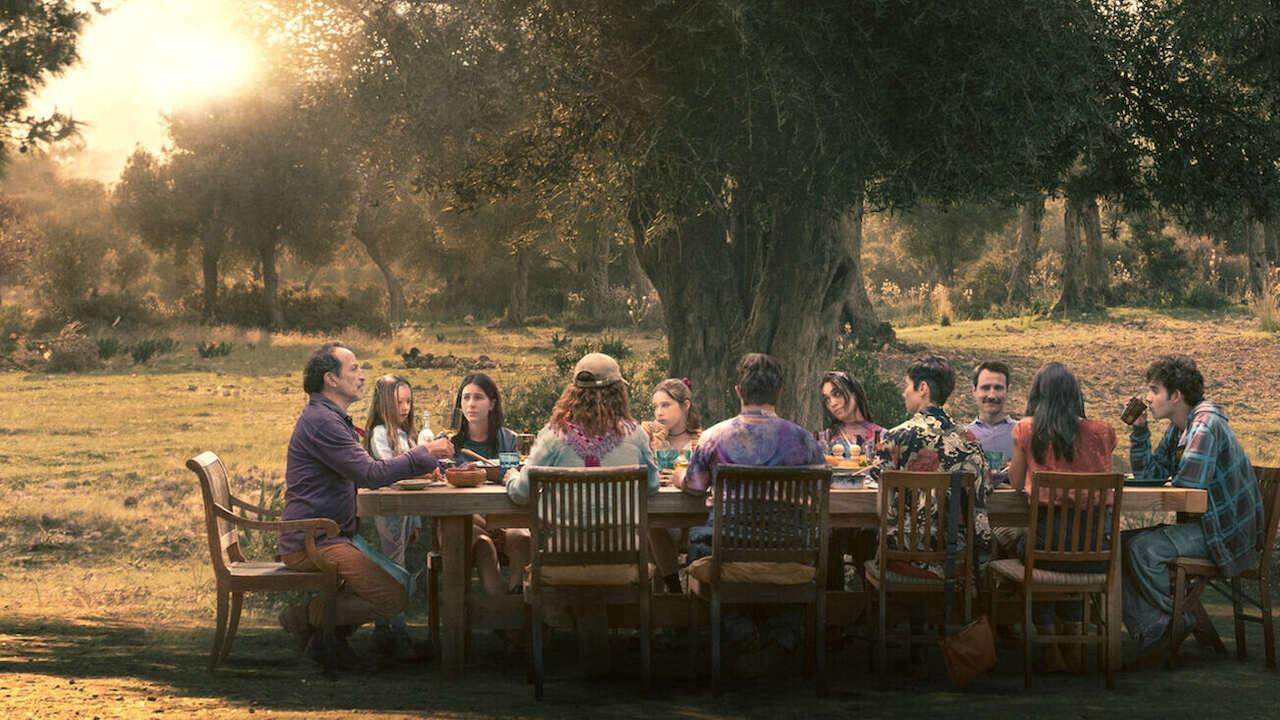
Rodrigo García's Familia, written by Bárbara Colio and Garcia, is a wonderfully made film. It keenly observes a family as they get together for a day at an olive ranch. The movie's strength obviously lies in its conversations. It feels as if the actors have absorbed every line. This doesn't mean they regurgitate words from the script. Instead, they seem to be talking about their own personal experience. Something like this can easily turn into a showy exercise for the actors. But everyone in Familia slips into their character. They don't "act." They comfortably occupy their positions. There is a lovely, unrehearsed flow to their arguments and discussions. Nothing comes across as careless. It's amazing how everyone shifts from one topic to another and later circles back to an earlier matter.
The scene near the beginning, where the family gathers in the kitchen, is terrific. It also sets up the mood of this film. While listening to the characters, you discover unpredictable rhythms in their exchanges. I was taken aback by the swiftness and effortlessness with which everyone moved from talking about pads and tampons to a fatal car accident. These characters don't really need a formal introduction. As soon as they appear on the screen, they look like fully formed individuals. This is why nothing about them shocks us throughout the film's duration. When a woman (Natalia Solián) reveals who the father of her child is, we just respond to the revelation with a shrug.
What this means is that Familia's dramatic core is very feeble. The tension erupts when the patriarch, Leo (Daniel Giménez Cacho), announces his intention of selling the ranch to a foreign corporation. He presents logical arguments like rising water bills, tax prices, etc., and the people who oppose him, like his daughter, Rebeca (Ilse Salas), put forward a more "romantic" view, saying things such as, "The house belongs to us. We all grew up here." Rebeca is planning to move to Chicago, but she assures everybody that she will return frequently to spend time with her family at the ranch. No one, unsurprisingly, believes her.
Familia, though, does not take sides. It tries to support both arguments. What it makes absolutely clear through a final shot is that the decision concerning the sale of the ranch is heartbreaking for Leo, too. That last shot, along with that scene where Clara (Maribel Verdú), Leo's girlfriend, talks about her father, who's suffering from Alzheimer's disease, is the most moving thing in this film. These two moments are so intense that everything else pales in comparison.
The family members know each other well. They know how to push each other's buttons. Their bond consists of sharp judgment and warm compassion. There are moments where you get so lost in their chitter-chatter that the boundaries of the screen disappear. You become unaware of the camera, the framing, and the cuts. All the actors are truly incredible. Still, in the end, you find the experience too neat, and too simple. There are not enough moments that place us in the middle of the action. For the most part, you admire the events from a distance. Messiness on the screen can be exciting. We go to the movies for drama. Familia, however, doesn't satisfy much in that respect. It's well-made, but it could have been more thrilling if it had space for more ugly conflicts. But oh, the actors...THE ACTORS!
Final Score- [7.5/10]
Reviewed by - Vikas Yadav
Follow @vikasonorous on Twitter
Publisher at Midgard Times
Hi Everyone, after a due consideration, we have decided that we will be open for donations to help us in managing our website. We will be greatful for any kind of amount we receive. Thanks!
— Midgard Times 🎬 (@Moviesr_net) January 4, 2026
PayPal- [email protected] pic.twitter.com/DlNNz5Npm5
Get all latest content delivered to your email a few times a month.
Bringing Pop Culture News from Every Realm, Get All the Latest Movie, TV News, Reviews & Trailers
Got Any questions? Drop an email to [email protected]